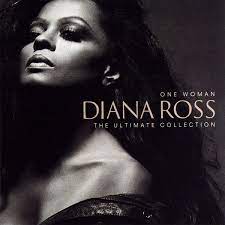DIANA ROSS : ONE WOMAN - THE ULTIMATE COLLECTION
- Where Did Our Love Go (With The Supremes)
- Baby Love (With The Supremes)
- Stop! In the Name of Love (With The Supremes)
- You Can't Hurry Love (With The Supremes)
- Reflections (With The Supremes)
- Reach Out and Touch (Somebody's Hand)
- Ain't No Mountain High Enough
- Touch Me in the Morning
- Theme from Mahogany ("Do You Know Where You're Going To")
- Love Hangover
- Upside Down
- Endless Love (With Lionel Richie)
- Why Do Fools Fall in Love
- Missing You
- Chain Reaction
- When You Tell Me That You Love Me
- One Shining Moment
- If We Hold on Together
- The Best Years of My Life
- Someday We'll Be Together
Label : EMI
Release Date : October 18, 1993
Length : 71:31
Review (AllMusic) : One Woman: The Ultimate Collection attempts to condense Diana Ross' most successful recordings into one 20-song, 71-minute disc. Well, there's good news and bad news. The good news is that Ross, who produced the album (which is to say, picked the tracks), has included six of her Supremes recordings from the '60s - one of them, "Someday We'll Be Together," in a new disco mix - and licensed a few songs from her stay at RCA in the '80s, making this the most wide-ranging of her compilations. The bad news is that she has jettisoned many possible hits (only ten of her 18 chart toppers are included) in the name of featuring four tracks from the '90s that do not rank with her best, either aesthetically or in terms of popularity. In other words, Ross has constructed the album as she might a concert - a sprinkling of early Supremes hits, all her biggest solo hits, and what she considers the highlights of her current work. The result is a less than perfect, or "ultimate" portrait, since the selection implies erroneously that a forgettable piece of tripe like the 1991 Top 40 hit "When You Tell Me That You Love Me" is as much a milestone in the Ross catalog as "You Can't Hurry Love" or "Upside Down" (and that Ross remained as significant an artist in 1994 as she was in 1964 and 1974). But the album still makes a good sampler of Ross' entire 30-plus-year career for beginners.
